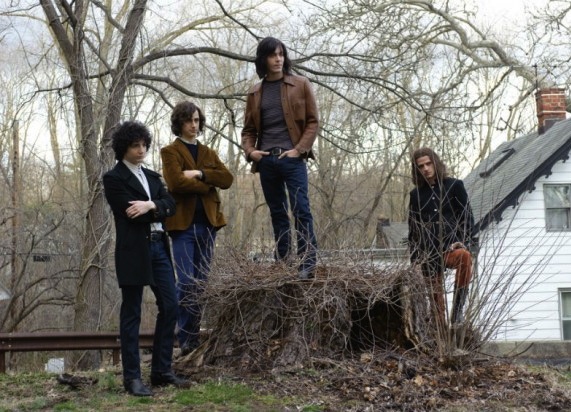REVIEW: It's Only Rock 'N' Roll? In David Chase's Dynamic, Witty 'Not Fade Away,' It's Life

Music not only serves as the subject but informs the very fabric of Not Fade Away, David Chase's savvy '60s-set feature film debut. Aided immeasurably by his keen ear for dialogue, Chase filters a suddenly tumultuous, transformative decade through the restrictive prism of conservative suburbia in this story of a New Jersey boy's coming of age, as political instability, class awareness and rock 'n' roll break in waves over the still-inchoate consciousness of several friends trying to form a band. Though starless, save for James Gandolfini's knockout supporting perf, this dynamic pic should resonate with auds countrywide upon its Dec. 21 release.
Not Fade Away injects the past with the nervous energy and exciting uncertainty of the present, devoid of nostalgia or biopic baggage, and infused with all the wicked wit that characterized Chase's The Sopranos and his bygone standout episodes of The Rockford Files. The move from TV to a theatrical canvas is mirrored in the picture's very conception, presenting the New Jersey microcosm as no longer a self-contained unit. Still, the film rarely leaves its setting, where Doug (John Magaro) lives with his looming, disapproving father (Gandolfini), his quasi-hysterical mother (Molly Price), and his little sister (Meg Guzulescu), who supplies voiceover narration and performs a wonderful curtain-dropper to boot.
Macrocosm first meets microcosm when Doug returns to Jersey from college sporting longer hair, Cuban heels and anti-war indignation, quitting his studies to devote himself to the rock band he started in high school. Chase's writing shines in this intricate relationship between world events and their impact on the everyday: Drawing from his own, decidedly more lackluster experience as a band drummer, the writer-helmer surrounds Doug with friends whose talents are not necessarily congruent with their ambitions and whose class differences manifest themselves erratically.
Thus, after lead singer/guitarist Gene (Jack Huston) temporarily knocks himself out by swallowing a lit joint, Doug takes over as vocalist, wowing the local crowd with his rendition of "Time Is On My Side," a glamorous position he soon assumes permanently, to Gene's ongoing resentment. Meanwhile, well-off Wells (Will Brill) wrestles with the philosophical implications of imminent fame, always worrying they'll "lose the mystique" they've built up with their barely existent fanbase.
The group covers the Rolling Stones, the Kinks and Bo Diddley with varying degrees of fidelity, but Not Fade Away pointedly refuses to follow either a difficult-road-to-success or downward-spiral-to-failure scenario. Instead, the music feeds off surrounding chaos, anchoring Doug's existence and coloring snapshots of various stages of his youth. His questioning whether to go for a more melodic or bluesier vocalization while listening to Leadbelly equates to his deciding on different attitudes toward life. Even movies and TV shows are defined through their music: The Twilight Zone announcing its presence to the protag through its signature theme, while Blow-Up confounds him with its silence.
Doug's evolving relationship with wealthier girlfriend Grace (Bella Heathcote) forms the film's other throughline and, like his interaction with certain band brothers, brings up issues of economic disparity. But Chase excels at diverting attention from the obvious and foregrounding the particular, as in how Doug's cramped kitchen contrasts with Grace's Toulouse Lautrec-wallpapered rec room, where his band plays parties. And when Doug is shown digging ditches at Grace's country club, the scene's focus stays completely on Doug's failed attempt to musically bond with Lander (Isiah Whitlock Jr.), a conservative black co-worker who only likes church music.
The young thesps play their characters, interestingly, as socially inept, with varying levels of self-assertion and intellectual pretension. Magaro's Doug, maturing in fits and starts, contrasts strikingly with Gandolfini's brilliant turn as a father undergoing a late-blooming epiphany.
Chase often matches and sometimes even betters Cameron Crowe or Floyd Mutrux in granting present-tense immediacy to the rock 'n' roll on the soundtrack, never smothering it with hindsight. In this endeavor, he was undoubtedly greatly assisted by exec producer/music supervisor Steven Van Zandt.
Follow Movieline on Twitter.

Comments
Please let me know if you're looking for a article author for
your blog. You have some really good posts and I think I would be a
good asset. If you ever want to take some of the load off, I'd absolutely love to write some content for
your blog in exchange for a link back to mine.
Please shoot me an email if interested. Thank you!
deals with that will look at concerning Twenty-four inches tall